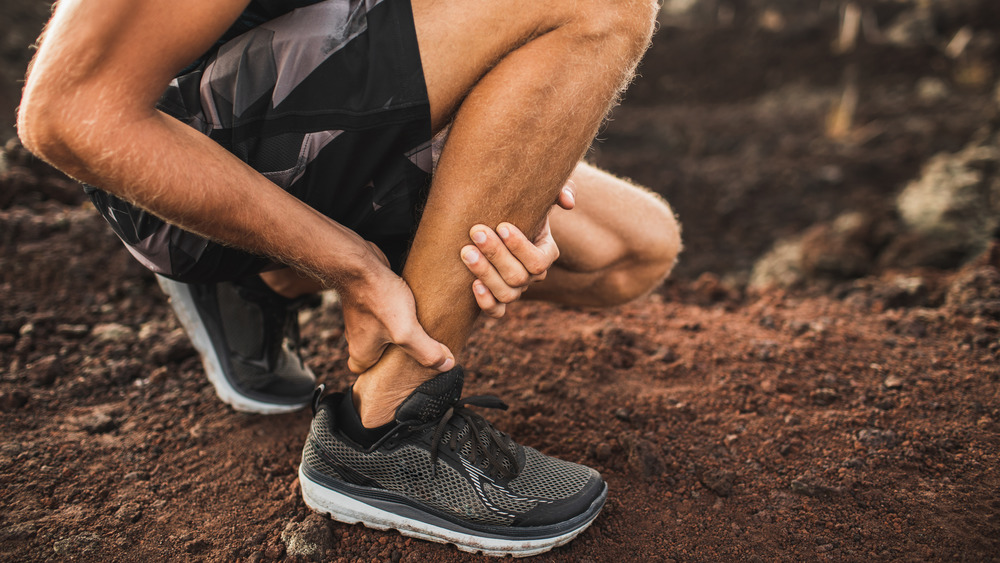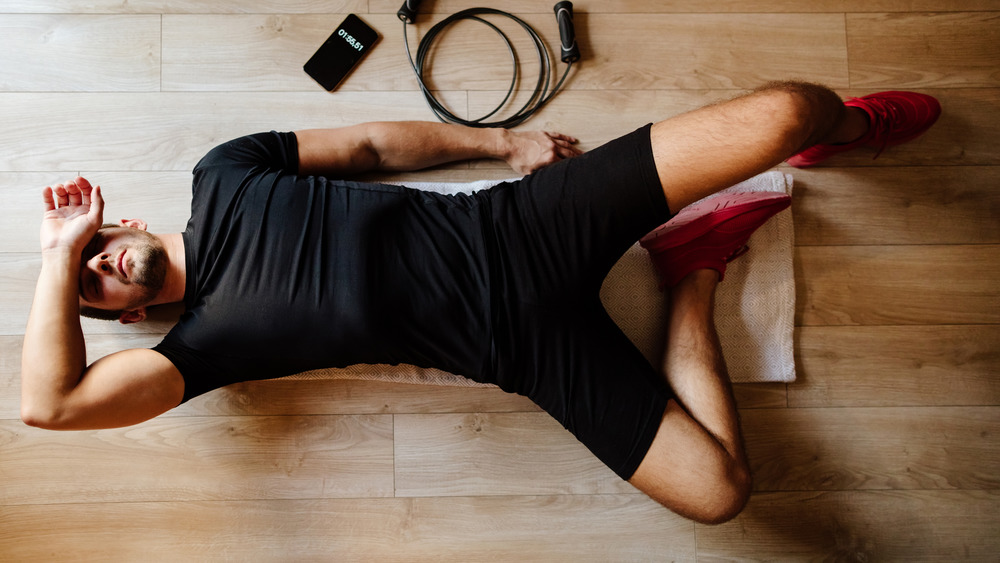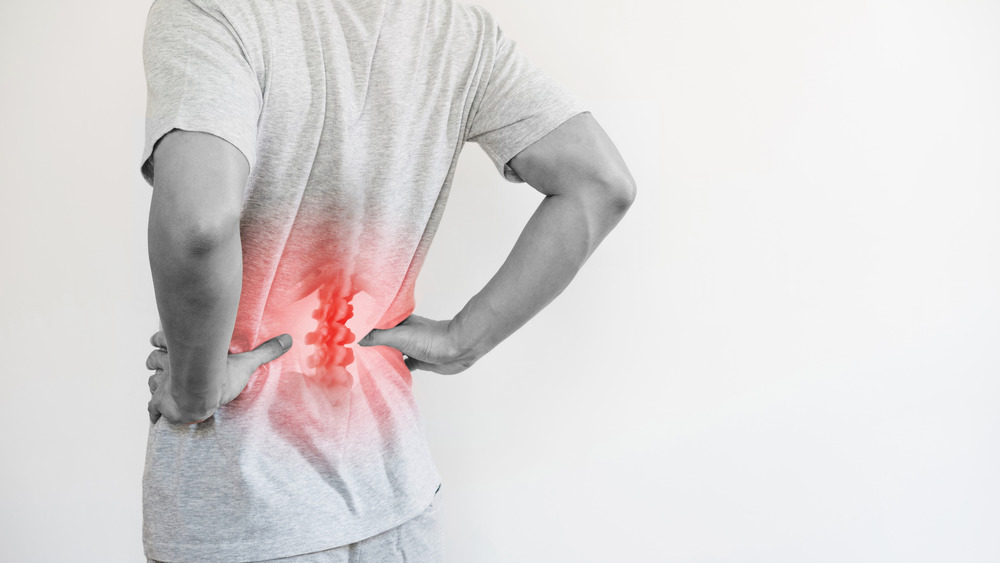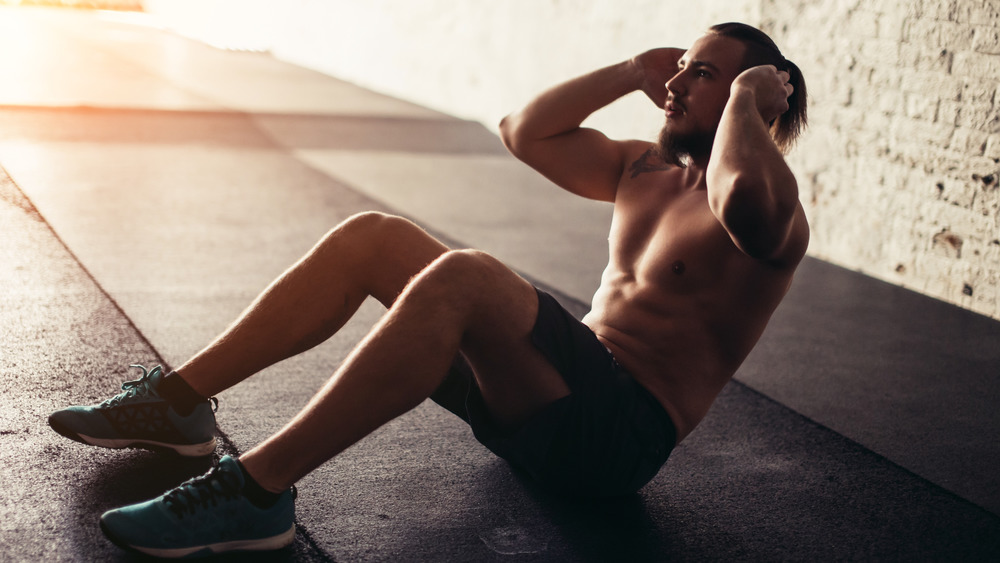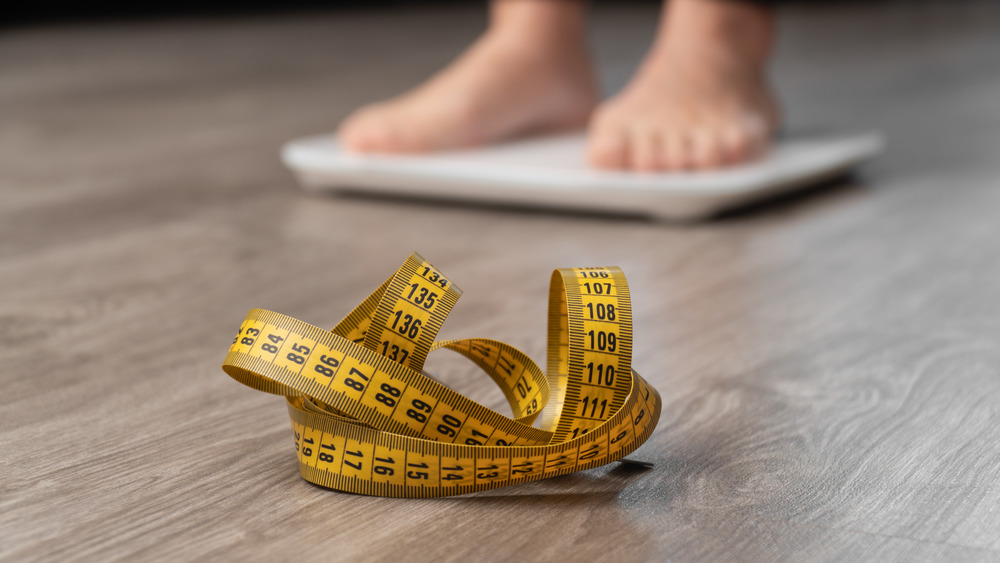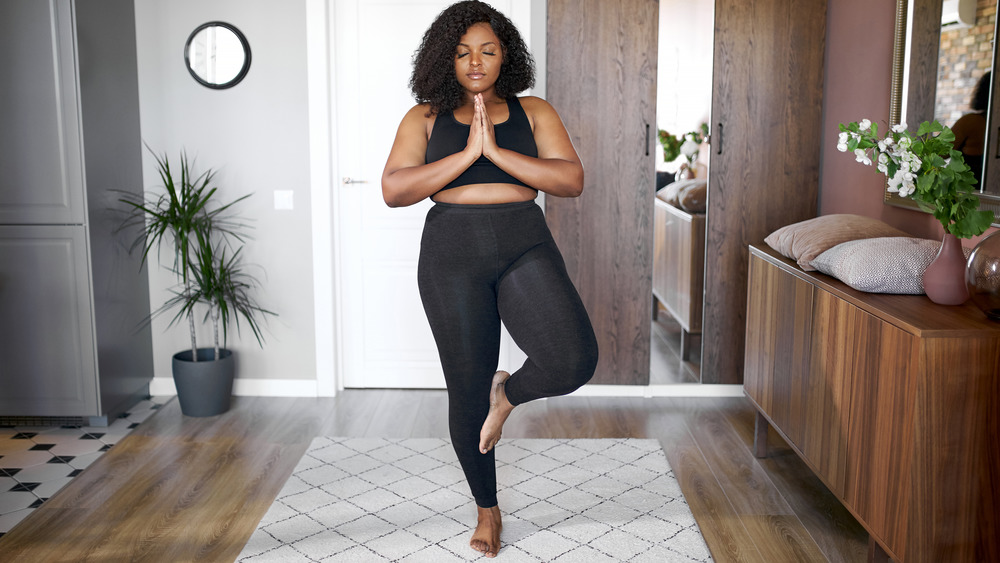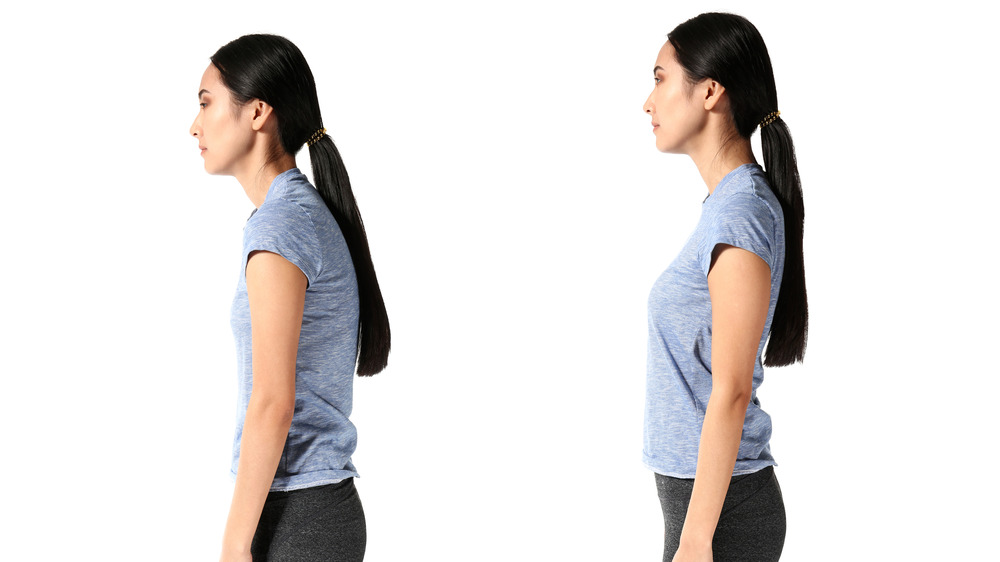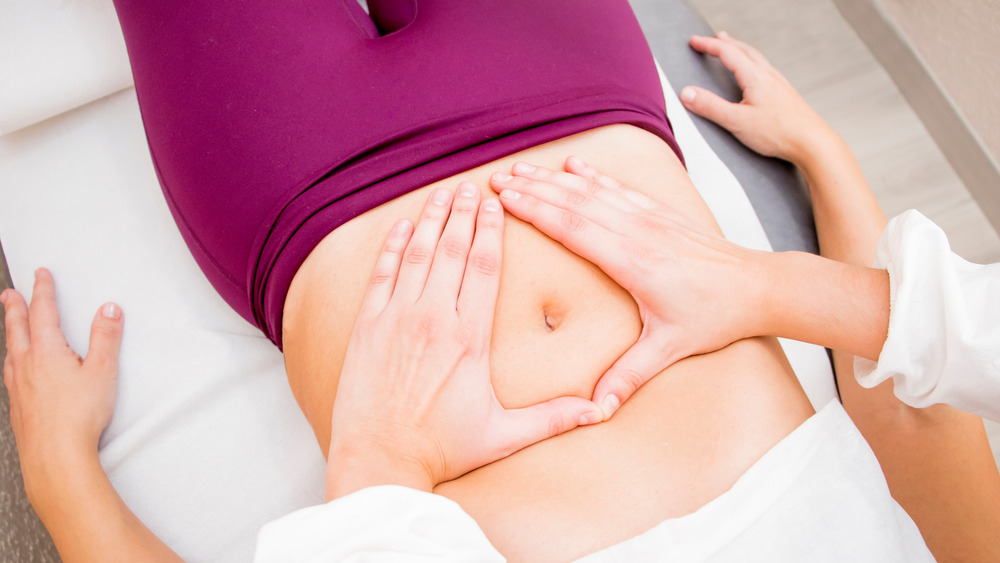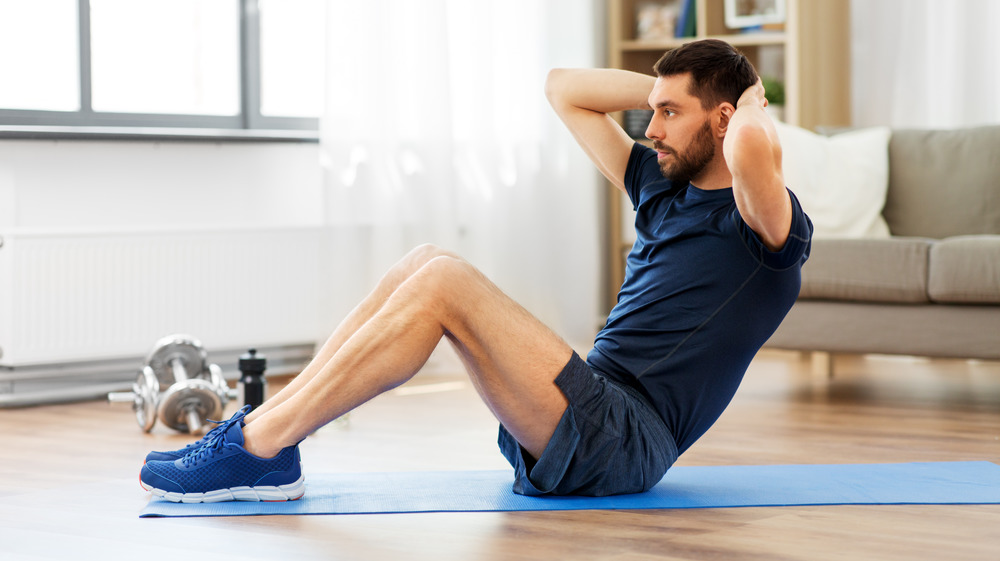What Happens To Your Body When You Do Ab Exercises Every Day
With six-pack abs considered the holy grail of fitness, it's no wonder so many are curious to learn the best way to get those rippling muscles. In fact, according to Village Gym, "how to get a six pack" is one of the most asked questions on Google, with a whopping 145,200 people each year looking to find out how to achieve a washboard stomach.
It's easy to understand why. Beyond the cosmetic reasons for a toned tummy, having stronger abs can help with flexibility and balance (via Healthline). More muscle tone in general also helps to increase your metabolism, bone strength, and energy levels, according to Livestrong. And so, it might seem logical that to get stronger abdominals, doing ab exercises every day is the way to go.
But what happens to your body when you do ab exercises every day — and is it something that you really should be doing? Here at Health Digest, we wanted to find out. Join us as we take a look.
Your core will get stronger when you do ab exercises every day
With the abs forming a large part of the central trunk of your body, connecting your upper and lower halves, strength is important. Luckily (and perhaps unsurprisingly), if you're doing ab exercises every day, you can expect your core to get stronger over time.
The abdominals are made up of four main muscles: the rectus abdominis, the muscle on the front of our stomach which gives the six-pack effect; the external obliques, running down each side of our torso; the internal obliques, a pair of deep muscles below the external obliques; and the transversus abdominis, a deep muscle that wraps around the torso and helps with respiration and breathing (via Verywell Fit).
When you work out your abs, these muscles sustain tiny tears in the muscle fibers, which, when they rebuild during recovery, become stronger, according to Self. Over time, your muscles get more and more toned. As such, focusing on abs is a useful way to strengthen your core. That is, as long as you allow for adequate recovery and focus on exercises that target the four main muscles in your stomach, such as planks (via Shape).
If you strengthen your abs, you'll be less likely to get an injury when doing other sports
Our bodies are composed of a complex system of muscles that, when exercising, work together to support the body as a whole. And if you're exercising your abs each and every day, you could reduce your risk of injury when engaging in other forms of exercises, like playing sports. How?
According to Bridge Athletic, the core is involved in almost every athletic action you take. When strengthening it, your body becomes less susceptible to overusing the other muscles in the body to generate energy and strength. This also takes pressure off your joints.
The link between core strength and athletic performance has also been corroborated by scientific studies. In a 2011 study published in the International Journal of Sports Physical Therapy, an apparent link was noted between core stability and increased athletic ability. If you're looking to keep yourself injury-free when working out, daily ab exercises could be an ally.
You risk overtraining when doing ab exercises every day
When we want to improve our fitness, the temptation sometimes is to go all in and work out every second of the day until we have a body that looks a little more akin to the ancient Greek deities we all model ourselves on, right? No? Just us?
However, it's important to be aware that you risk overworking your muscles when doing daily ab exercises. And that may end up doing some harm. As Livestrong pointed out, overtraining your abs can lead to severe muscle soreness, which can cause serious injury and potentially torn muscles, both in your abdominals and in other muscles in your body that may need to step in to compensate if your abs are made weaker through exercising too much.
More generally, overtraining can, as the Hospital for Special Surgery says, lead to an inability to train, longer recovery times, poor sleep, and lack of motivation. To avoid overtraining, make sure to incorporate rest days into your routine and listen to your body — and remember that working something out every single day may have the opposite effect than what you desire.
Daily ab exercises could lead to a neck injury
When you train your abs — particularly when doing exercises like crunches and sit-ups that involve lying on your back on the floor — you can sometimes engage other muscles unintentionally. That may sound like a good thing, but it can be a problem — especially if you find that your neck's getting involved.
According to physical therapist and certified strength and conditioning specialist Mike Reinold, speaking in an interview with Self, "If your abdominal muscles are weak and inefficient at a movement, you may compensate with the neck to get through the exercise." As Reinold went on to explain, you shouldn't be feeling any unnecessary tension or strain in your neck when you exercise. If you do, it means that you're not performing the exercises with the correct form. And that can cause neck pain and even strain, per Shape.
If you're performing ab exercises each day, pay attention to just how much you're engaging your neck. Be sure to work out with the proper form, trying to keep the abs engaged instead of the upper body. And, as always, if it hurts: stop.
Ab exercises may help treat back pain
When you do ab exercises every day, the front of your body will (naturally) benefit. But your back is also involved, and may even benefit from your ab exercises. In a Q&A with the Cleveland Clinic, doctor of physical therapy and strength and conditioning specialist Patti Mariano Kopasakis highlighted the link between core strength and back pain. As she said, by strengthening the muscles in your core — specifically around the lower back — you avoid your body having to resort to using "passive structures" of the back to support and stabilize the area, which can include ligaments, spinal bones, and discs. All such things can cause back pain.
Although Kapasakis pointed toward studies showing that specific core exercises in themselves may not be helpful for back pain, she did claim that core-focused muscle work can provide additional benefits on top of general exercise. You may find movements like planks, side planks, and bird dogs to be helpful in reducing back pain.
Your muscles could become imbalanced when you do ab exercises every day
One of the main aims of doing ab exercises daily is, of course, a ripped stomach. But having washboard abs while every other muscle in your body is underworked? Not so great. If you're only exercising your abs every day and neglecting other parts of your body, you may experience muscle imbalances. This is common when certain muscles are trained more rigorously (and therefore get stronger) than others, Marc Perry, certified strength and conditioning coach and personal trainer, explained in an article for Built Lean.
This can be a problem both if you're not working out any other muscles in your body as comprehensively or if you're only focusing on your front abs instead of your obliques. That can "lead to postural problems" and injury, according to Perry.
If you're planning on working out your abs every day, be sure to also focus on other muscles in your body. And even when doing ab exercises, you'll want to engage all of your ab muscles, and not just the six-pack muscle, or rectus abdominis.
Depending on the ab exercises you're doing daily, you could be hurting your spine
Exercising your abs involves your core as well as your back and, naturally, your spine. And as your spine is the structural center of your body, making sure it's protected is crucial. If you're doing ab exercises every day, you'll want to keep an eye on how it's impacting your spine health. Certain exercises could be causing undue strain.
Take sit-ups, for example. When you perform a sit-up, your spine is pushed into the ground, and your hip flexors — the muscles that connect your legs with your central trunk — are activated (via Healthbeat). When your hip flexors are imbalanced, they can cause a tug on your lower spine, which can cause back stress, discomfort, and pain. Over time, this isn't great news for your spine — and this is especially true if you're exercising like this every day.
Instead, incorporate movements that are healthier for your back when performing ab exercises, such as front or side planks, dying bugs, or ab wheel rollouts, NBC News suggested. Your spine will thank you!
You won't necessarily lose weight when doing ab exercises every day
Doing ab exercises can cause you to look slimmer, more toned, and leave you with a rippling six-pack. But it's all relative to your body weight and body fat percentage — and one thing that doing ab exercises won't necessarily do is lower your weight.
As Healthline pointed out, performing ab exercises will indeed strengthen your stomach. But, no matter how strong your abs get, if they're covered with a layer of fat, you may not achieve the visible result you desire. And ab exercises will not reduce the amount of subcutaneous belly fat on their own, according to various studies cited by the publication. While you may have heard of "spot reduction," it's really a myth.
To reveal your abdominal muscles, it's useful to instead focus on keeping your overall level of body fat down. One of the most efficient ways of doing this is through incorporating cardio into your workout routine, which, as the Cleveland Clinic revealed, can assist with weight loss and management. And even if you don't want to lose weight, cardio can change your body in other ways, including decreasing your risk of heart disease, lowering your blood pressure, and increasing your "good" cholesterol.
Your balance could improve when you do ab exercises daily
With the core at play in all of your daily functions, the support it offers the body is paramount. It's good to know that doing daily ab and other core exercises could help you improve our balance, keeping you steady on your feet. As Kailin Collins, a physical therapist at Harvard-affiliated Massachusetts General Hospital, told Harvard Health Letter, "Core strength is intimately related to balance, because you need good stability at your core to have safe and effective movement at the hip, knee, and ankle."
Although balance is important at any stage of your life, it's even more crucial when you're in your later years. This is often when balance issues become more profound. A 2014 study published in the Journal of Aging and Physical Activity found that an increase in core strength among older adults resulted in an improvement of balance performance, with the study recommending that core exercises should be a permanent aspect of balance-training among the elderly.
Could ab exercises improve your posture?
If, like us, you spend your days hunched over a laptop, it might encourage you to know that ab exercises could just improve your posture. Yes, we could all learn a thing or two from this one.
According to WebMD, training your core muscles is "the best way" to improve your posture, since core training helps to stabilize your pelvis and spine and helps you move your torso correctly, contributing to a healthier stance. WebMD recommends single leg extensions, crossovers, and planks to help augment posture.
However, you may want to reconsider daily core exercises. According to Built Lean, training your abs daily, particularly with exercises like crunches, causes you to contract your ab muscles, making them shorter and tighter, which could make you hunch over more, thus worsening your posture. You may even want to skip standard crunches altogether and stick to what WebMD called "the new crunch," or "curl-up." As the publication explained, it "works the rectus abdominis (the six-pack muscle) and obliques (which run diagonally around your waist and rotate your torso)." This strengthens your core and improves your posture.
Strengthening your abs will strengthen your pelvic floor
When exercising, you may tend to focus on the visible benefits that it has for your body. It's important to remember, though, that strengthening your muscles can have pretty profound internal effects. And those daily ab exercises you've been doing may actually be contributing to a stronger pelvic floor.
The pelvic floor muscles help to support the bladder, bowel, and, in women, the uterus. It plays a vital role in the discharge of waste products from the body, sexual function, and the birth process (via Healthline). Pelvic floor function can decrease as you get older, and it can also weaken after childbirth.
A weak pelvic floor can lead to issues like incontinence and a lack of flatulence control, so seeking to keep it strong is a useful endeavor. And according to Health, certain exercises that focus on the lower abs (think: toe tips and hip bridges) can help to keep the pelvic floor strong or strengthen it again if it's weakened.
Your hip flexors might be working too hard when you do ab exercises every day
Although training your abs every day should logically lead to stronger abs, you may not see the results you want if you're not using the correct form. If your body starts to engage your hip flexors when performing ab exercises, you could even see fewer gains.
The hip flexors connect your legs and core. They're the muscles that help your legs and knees bend up toward your torso (via Verywell Fit). While they're closely related to your abdominal muscles, they don't make up the four main muscles in your core — the ones we associate with core strength and rock-hard abs.
However, when you exercise your abs — particularly with exercises like roll ups, in which you bring your upper body up to meet your lower body — your hip flexors can activate and take some of the strain, Verywell Fit explained. That's pretty kind of them to try to help you out, but it means your ab muscles will get less of a workout. When doing ab exercises, try to do them with the best form possible to target the muscles you want.
Ab exercises could just help you sleep better
Daily exercise impacts the bodily systems and functions enormously — sometimes in ways we don't immediately think of, like sleep health. By doing ab exercises every day, you might just find you're drifting off to Slumberland a little easier.
A study led by Jason Bennie, associate professor in physical activity epidemiology at the University of Southern Queensland in Australia, examined the link between resistance training and quality of sleep in over 23,000 adults. As Bennie noted when speaking with Runner's World, previous studies have looked at the link between aerobic exercise and sleep quality, but "our study was the first to describe the associations between muscle-strengthening exercise and sleep quality, especially among a large population sample."
The study found a positive link between resistance training and sleep quality — although it found the impact on sleep was largely the same for those who did resistance training once a week and those who did so five times per week. As such, it's useful to know that the long-standing association between exercise and good sleep extends to strength training (via Johns Hopkins Medicine). That's pretty great news if you're working your abs regularly.
Ab exercises can help you recover from surgery faster
Recovering from medical and surgical procedures can take time, patience, and work. Luckily, daily ab exercises could help aid your recovery from surgery, including a Caesarian section (aka C-sections).
Isa Herrara, a pelvic floor physical therapist and strength and conditioning coach, told Livestrong that daily ab exercises can help in several ways. "Anyone who is fully healed from any type of surgery or recovering from back surgery, Cesarean birth or any back issues could do abs every day to heal their pain, to improve their posture and to improve stamina for athletic activities," the expert explained.
It's important to bear in mind, however, that after surgery, your body needs adequate time and care to recover. If you're considering engaging in daily ab exercises to hasten recovery, consult with a healthcare professional to advise you on when it's safe to re-engage with physical activity. If you try to jump back into exercise too quickly, it may do more harm than good.



